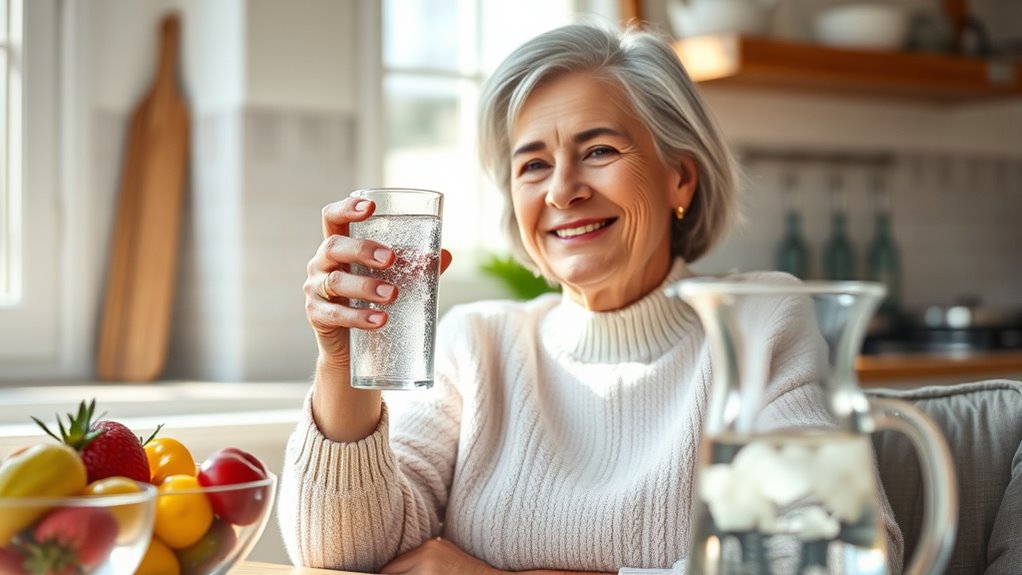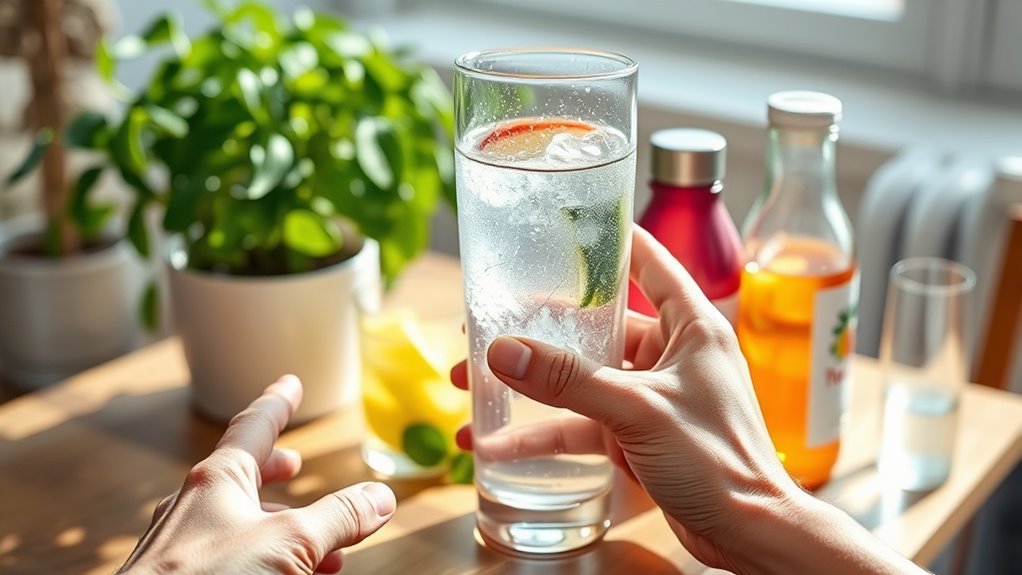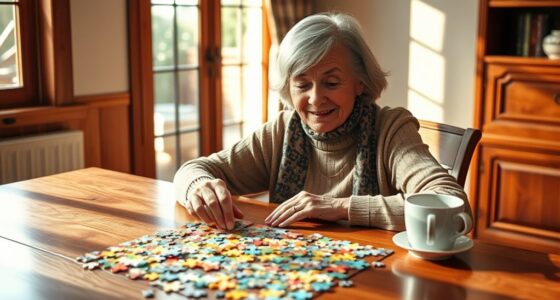To stay well-hydrated, sip water regularly throughout the day, even if you don’t feel very thirsty, as thirst can diminish with age. Include electrolyte-rich foods like bananas and spinach, and consider drinks like electrolyte-enhanced waters when needed. Watch for signs like dry mouth or dark urine and adjust your intake accordingly. Keep these tips in mind to maintain your health, and you’ll discover how simple changes can make a big difference.
Key Takeaways
- Encourage regular, small sips of water throughout the day to prevent dehydration symptoms.
- Incorporate electrolyte-rich foods like bananas, spinach, and oranges into daily meals.
- Use reminders or routines to promote consistent fluid intake, especially during hot weather or physical activity.
- Monitor for dehydration signs such as dry mouth, dark urine, or dizziness, as thirst may diminish with age.
- Consult healthcare providers about personalized hydration strategies, especially when on medications or managing health conditions.

Staying well-hydrated is essential for your health, especially as you age. Proper hydration supports your body’s functions, from digestion to circulation, and helps keep your skin and joints healthy. One key aspect of maintaining good hydration is ensuring your electrolyte balance remains steady. Electrolytes like sodium, potassium, and magnesium are minerals that help your body retain fluids, transmit nerve signals, and regulate muscle function. When you’re dehydrated, your electrolyte balance can become disrupted, leading to symptoms like muscle cramps, dizziness, and confusion. Recognizing dehydration symptoms early is vital because they can escalate quickly, especially in older adults. Common signs include dry mouth, dark-colored urine, fatigue, and feeling lightheaded. If you notice these signs, it’s a clear indication that you need to increase your fluid intake.
Proper hydration and electrolyte balance are vital for health, especially as you age.
To keep your electrolyte levels balanced, incorporate drinks that contain electrolytes, such as sports drinks, coconut water, or electrolyte-enhanced waters, especially if you’re sweating heavily or feeling unwell. Eating a balanced diet rich in fruits and vegetables also helps replenish important minerals. Bananas, oranges, spinach, and potatoes are excellent sources of potassium, which is crucial for maintaining fluid balance and proper muscle function. Additionally, if you’re experiencing symptoms of dehydration, drinking water alone might not be enough; supplementing with electrolyte-rich beverages can help restore the balance more efficiently. Maintaining electrolyte balance is especially important in preventing complications related to dehydration.
Pay attention to your body’s signals. Thirst is an obvious indicator, but as you age, your sense of thirst may diminish, making it easier to overlook dehydration symptoms. Consequently, proactively drinking fluids throughout the day is a good strategy. Aim for small, regular sips rather than waiting until you’re extremely thirsty, which can be a sign you’ve already started to become dehydrated. It’s also wise to set reminders or establish routines to drink water consistently, especially during hot weather or if you’re physically active.
Be mindful of other factors that influence hydration, such as medications that may cause you to lose fluids or medical conditions like diabetes. These can increase your risk of dehydration, so consult your healthcare provider for personalized advice. Remember, dehydration isn’t just about feeling thirsty; it can impact your overall health, leading to complications like urinary tract infections or falls due to dizziness. Maintaining a steady intake of fluids, monitoring dehydration symptoms, and ensuring electrolyte balance are all important steps in staying healthy as you age. By staying attentive and proactive, you can enjoy better hydration and improved well-being every day.
Frequently Asked Questions
How Does Aging Affect Thirst Sensation?
As you age, your thirst perception tends to diminish, making it harder to recognize when you’re dehydrated. Age-related dryness in your mouth and throat can also mask feeling thirsty. This means you might not feel the urge to drink even when your body needs fluids. To stay properly hydrated, it’s crucial to develop habits like drinking regularly, regardless of thirst cues, to prevent dehydration and maintain overall health.
Are There Specific Fluids Better for Hydration in Older Adults?
You should focus on fluids that support electrolyte balance and promote fluid absorption, like water with added electrolytes or sports drinks. These help maintain your body’s electrolyte levels, which are essential for hydration. Avoid drinks high in sugar or caffeine, as they can dehydrate you. Prioritize small, regular sips throughout the day to guarantee proper hydration, especially since aging can affect your body’s ability to absorb fluids efficiently.
Can Medications Impact Hydration Needs in Seniors?
Medications can markedly impact your hydration needs, much like a leaky faucet drains your sink. Some drugs, due to medication side effects like increased urination or dry mouth, raise your fluid requirements. Others may interact with fluids, making hydration more complex. You need to stay vigilant, drink more water if advised, and consult your healthcare provider about fluid interactions to prevent dehydration and maintain your health effectively.
How Can Caregivers Encourage Older Adults to Drink More?
You can encourage older adults to drink more by making hydration enjoyable. Add flavor enhancement like lemon or berries to their water, making it tastier. Establish hydration schedules, setting regular reminders to drink throughout the day. Offer a variety of beverages, including herbal teas or fruit-infused water. Engaging them in these routines helps build habits, ensuring they stay well-hydrated and feel more motivated to maintain their fluid intake.
What Are Signs of Dehydration in Elderly Individuals?
Dehydration can sneak up like a thief in the night, signaling itself through dry mouth, dizziness, and dark urine. You’ll notice electrolyte balance slipping, making muscles weak or cramping. Watch for confusion, fatigue, or sunken eyes, as these are clear signs of dehydration risks in elderly individuals. Staying alert helps you catch these signs early, ensuring they stay hydrated and healthy.
Conclusion
Staying well-hydrated is key to maintaining your health and vigor as you age. Keep a close eye on your fluid intake, and don’t wait until you’re thirsty to sip some water. Remember, prevention is better than cure—it’s easier to stay ahead than to catch up later. By making hydration a daily habit, you’re giving yourself the best shot at feeling your best and enjoying life to the fullest. Stay proactive—your body will thank you.









